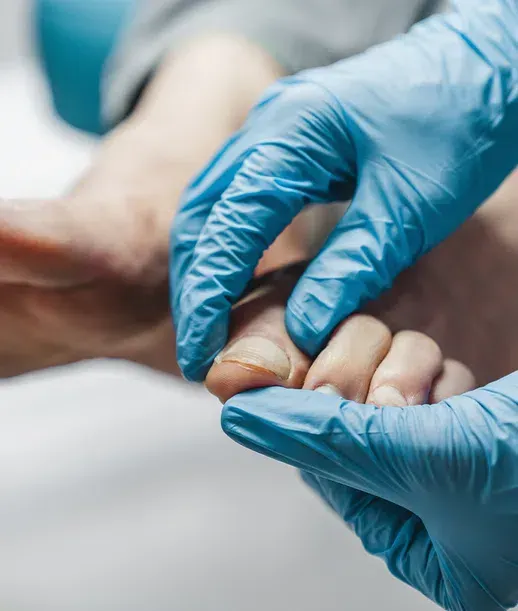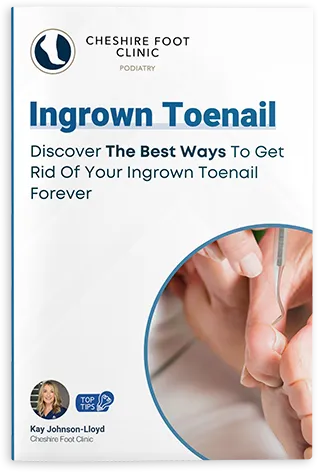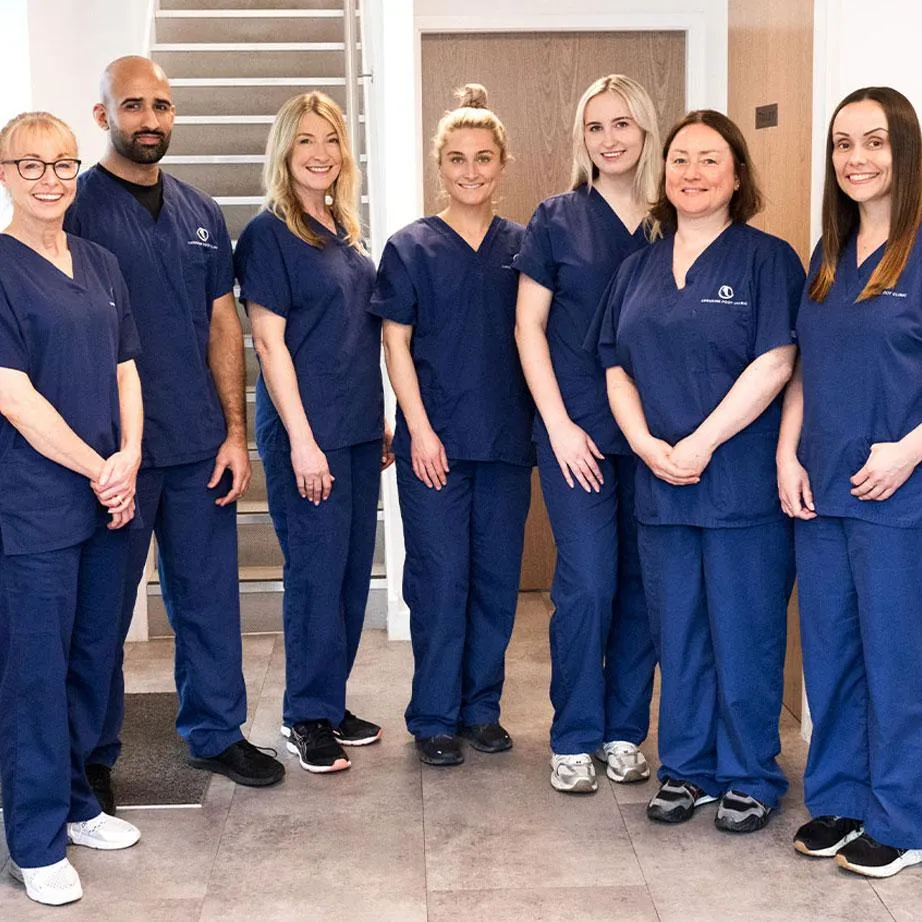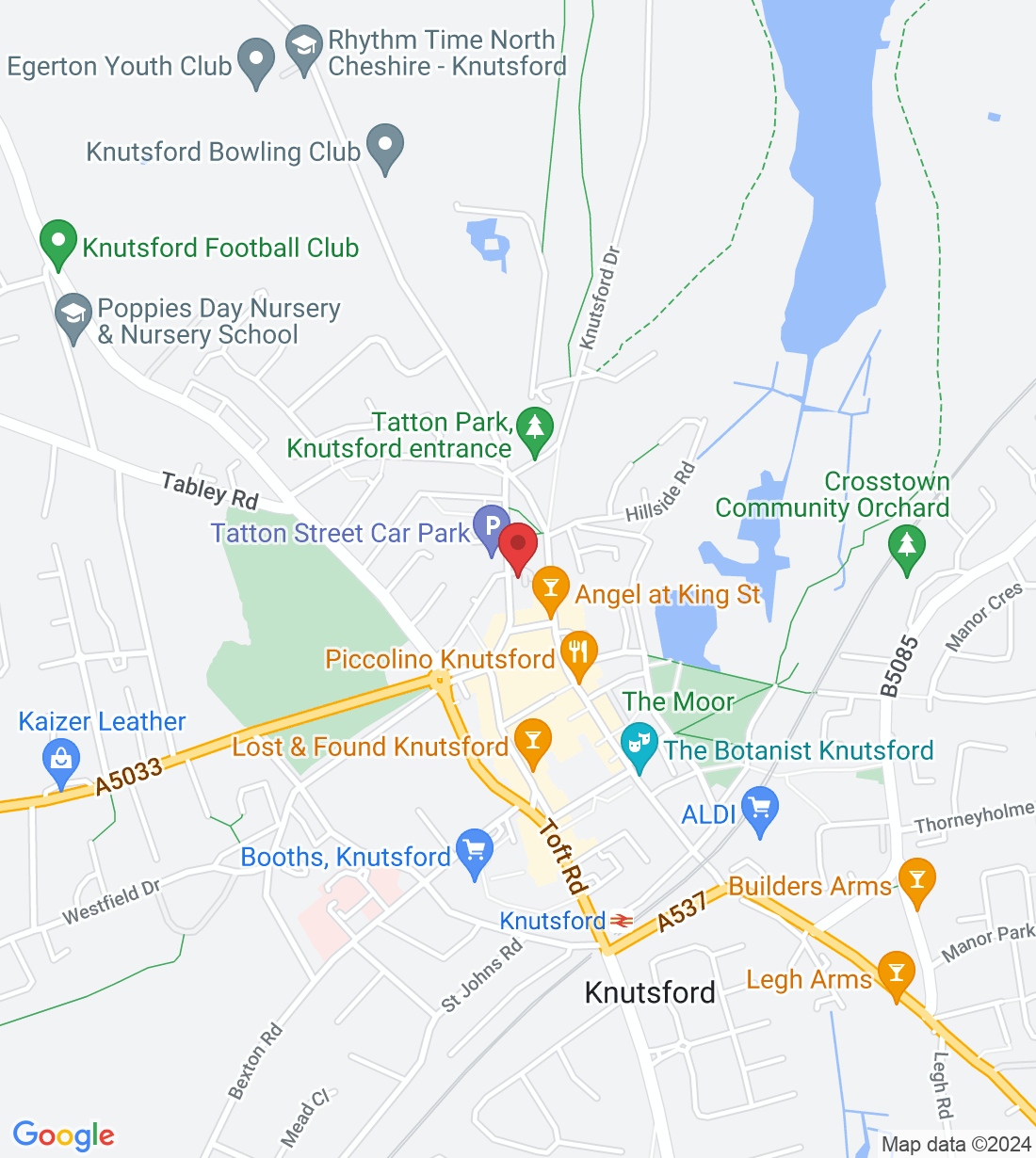Are You Looking For A Solution To Your Ingrown Toenail In Knutsford, Cheshire ?
Conveniently located near the M6 and M56
Cheshire Foot Clinic, 21A Tatton Street, Knutsford, WA16 6AE
There is a large car park opposite with designated disabled spaces closest to the clinic


Download Your FREE Ingrown Toenail Information Pack:
"Discover The Best Ways To Get Rid Of Your Ingrown Toenail Forever"
👇 Click the button below to get your FREE Report 👇
Your Go-To Foot Clinic for Top-Rated Podiatry & Chiropody Treatments
Knutsford, Cheshire
Does any of this sound like YOU?
Do you find yourself having to go back repeatedly to have your ingrown toenail treated?
Has your doctor prescribed too many antibiotics, yet you are still in pain?
Have you spent excessive time and money trying various home remedies?
Have you been informed that toenail surgery is the next necessary step?
Have you started to worry that you will never get rid of your ingrown toenail and may never be able to resume the activities you love?
If you answered YES to any of the above, you may have found the ANSWER to your ingrowing toenaill at Cheshire Foot Clinic, Knutsford, Cheshire

Got a Question?
Ask Cheshire Foot Clinic And The Team
What is an Ingrown Toenail?
At the Cheshire Foot Clinic, we understand the discomfort and pain that ingrown toenails can cause, and we want to provide you with valuable information on how to treat this issue.
An ingrown toenail is a painful condition that occurs when the edge of the toenail grows into the surrounding skin. While it commonly affects the big toe, it can develop in any toe on the foot. The symptoms of an ingrown toenail include pain, redness, and swelling in the affected area.
One of the main causes of ingrown toenails is improper nail trimming. Cutting the nails too short or rounding the edges can encourage the nail to grow into the skin instead of straight out. This can lead to the development of an ingrown toenail.
Additionally, injuries to the toe, such as stubbing it or dropping something heavy on it, can also contribute to the condition. In some cases, individuals may have an inherited nail shape that increases their susceptibility to ingrown toenails.
What Are the Symptoms of an Ingrown Toenail?
An ingrown toenail can cause discomfort and pain, and it occurs when the edge of the toenail grows into the surrounding skin. Understanding the symptoms of an ingrown toenail is essential for early identification and prompt treatment. While improper toenail-cutting practices are a common cause, there are several other factors that can contribute to the development of this condition. Consulting a qualified podiatrist for a thorough assessment can help identify the underlying causes and create an effective treatment plan.
Symptoms of an Ingrown Toenail:
Pain: One of the primary symptoms of an ingrown toenail is pain in the affected toe. The pain may range from mild discomfort to intense throbbing, especially when pressure is applied to the toe or when wearing shoes.
Redness and Swelling: The area around the ingrown toenail often becomes red and swollen. The skin may appear inflamed and feel tender to the touch.
Infection: If left untreated, an ingrown toenail can lead to an infection. Symptoms of infection include increased pain, warmth, pus or drainage from the affected area, and the presence of an unpleasant odour.
Difficulty Walking: The discomfort caused by an ingrown toenail can make it challenging to walk normally. This can affect mobility and daily activities.
Have Questions? One of Our Team Will Call You FREE of Charge
Fill in the form to request a Call From Our Team
One of our team members will call you FREE of charge and answer any questions or concerns that you may have.

What Causes Ingrown Toenails?
Ingrown toenails are often caused by improper toenail-cutting practices, such as cutting the nails too short or rounding the edges. However, there are several other factors that can contribute to the development of this condition. Wearing tight-fitting shoes, fungal infections, excessive sweating, nail trauma, certain medications, genetics, and foot anatomy can all play a role in the occurrence of ingrown toenails. Understanding the causes of ingrown toenails is crucial for prevention and seeking appropriate treatment when needed.
Symptoms of an Ingrown Toenail:
Improper Toenail-Cutting Practises: Cutting the nails too short or rounding the edges can cause the nails to grow into the surrounding soft tissue, leading to an ingrown toenail.
Tight-Fitting Shoes: Wearing shoes that are too narrow or tight can put pressure on the toes, increasing the likelihood of the nail growing into the skin.
Fungal Infections: Fungal infections of the toenails can cause thickening and deformity of the nails, making them more likely to become ingrown.
Hyperhidrosis (Excessive Sweating): Excessive sweating of the feet can soften the skin around the nails, making it easier for the nail to penetrate the skin.
Nail Trauma: Injuries to the toe, such as stubbing or jamming it, can result in the nail growing abnormally and becoming ingrown.
Certain Medications: Certain medications, such as those used to treat nail psoriasis or cancer, can affect nail growth and increase the risk of ingrown toenails.
Genetics and Foot Anatomy: Some individuals may have inherited nail shapes or foot structures that make them more prone to developing ingrown toenails.

Download Your FREE Ingrown Toenail Information Pack:
"Discover The Best Ways To Get Rid Of Your Ingrown Toenail Forever"
👇 Click the button below to get your FREE Report 👇
Who is Affected by Ingrown Toenails?
Ingrown toenails can affect anyone regardless of age or background, but some patients face a higher risk of complications. Those who are immunocompromised, have circulation issues, or people with diabetes are particularly vulnerable and should seek prompt treatment to avoid further complications.
Research suggests that 2.5-5% of the population suffers from ingrown toenails, and the prevalence appears to be increasing in recent years. Adolescents between the ages of 12-30 are particularly susceptible to ingrown toenails, with males being affected twice as often as females.
Download Your FREE Ingrown Toenail Information Pack

"Discover The Best Ways To Get Rid Of Your Ingrown Toenail Forever"

Treatment Options for Ingrown Toenails
Effective treatment for ingrown toenails requires careful consideration by a qualified podiatrist to achieve optimal outcomes. The appropriate treatment may vary depending on the stage of the diagnosed ingrown toenail, ranging from conservative techniques to surgical interventions.
Conservative methods are typically recommended for mild to moderate cases (stages 1 and 2) of ingrown toenails, while more severe cases (stage 3) may require surgical intervention. Additional internal factors, such as allergies, pregnancy, bleeding disorders, or significant medical histories, can also influence treatment selection. Our podiatrists possess the knowledge and expertise to evaluate and treat various conditions, working closely with you to ensure the provision of the finest care.
Numerous conservative measures are available to treat ingrown toenails, proving highly effective for patients diagnosed in stages 1 or 2.
These measures may include:
Footwear advice: Proper footwear selection can ensure adequate room in the toe box, preventing the nails from growing into the surrounding skin.
Podiatry nail resection: This involves a podiatrist carefully cutting out the nail spicule with or without local anesthesia. It is often the first-line treatment for mild to moderate cases of ingrown toenails.
Correct nail trimming and education: This includes avoiding curved cutting and leaving sharp edges, which can contribute to ingrown toenails.
For more severe cases of ingrown toenails (stage 3), surgical procedures may be necessary. These procedures are performed under local anesthesia, which is administered by a podiatrist.
Tired of Living With Ingrown Toenails? We Can Help
Fill in the form to request a Call From Our Team
One of our team members will call you for FREE and answer any questions or concerns you may have about your condition.

Still Not Sure If Ingrown Toenail Surgery is Right For You? Take Us Up On One Of Our FREE Options
Option #1 (👍 most popular)

Option #2


From Consultation to Treatment
What to Expect at Your First Podiatry Visit
We're excited to see you at your appointment! We want to make sure you feel comfortable and well-informed, so don't hesitate to ask us any questions about our treatments, our clinic, or even our payment options. Our goal is to help you get back to living your life free of pain, so let's work together to make that happen!
Discuss your foot health goals
Complete foot examination
Discover your options
Start a custom treatment plan


8 Reasons To Choose Cheshire Foot Clinic
Professional, Friendly, and Knowledgeable: Our patients say that our dedicated team is professional, friendly, and knowledgeable. They are experts in their field and in creating an environment where you feel comfortable discussing your foot care needs.
Individual Treatment Plans: We understand that each person is unique, and so are their feet. That's why at Cheshire Foot Clinic, we tailor treatment plans to address your specific concerns. Whether you're dealing with a common issue or a rare condition, our personalised approach ensures you receive the care that suits your individual needs.
A Wide Range of Foot Care Services: Cheshire Foot Clinic offers a comprehensive foot care service to cater to diverse needs. From routine check-ups to advanced treatments, our clinic is well-equipped to handle most foot conditions. Whether you need preventive care or specialised interventions, we've got you covered.
Collectively Over 50 Years of Experience: Benefit from the wealth of experience our team brings to the table. With well over 50 years of combined expertise, Cheshire Foot Clinic guarantees professionals who have encountered and successfully addressed a wide spectrum of foot-related issues. Trust us to provide effective solutions based on our extensive knowledge and hands-on experience.
Full Assessment of All Our Patients: Every patient at Cheshire Foot Clinic undergoes a thorough and comprehensive assessment. We believe in leaving no stone unturned when it comes to understanding your foot health. This meticulous approach ensures that we identify underlying issues, enabling us to devise the most suitable treatment plans for optimal results.
Members of the Royal College of Podiatrists and HCPC Registered: Our commitment to excellence is reflected in our affiliation with the Royal College of Podiatrists. We are dedicated to upholding the highest standards of patient care.
Fully Equipped Treatment Rooms and Disabled Access: Cheshire Foot Clinic prioritises accessibility and comfort. Our fully equipped treatment rooms are designed to provide a seamless and efficient experience for our patients. We also ensure disabled access, ensuring that everyone, regardless of mobility challenges, can benefit from our exceptional foot care services.
Exceptional Patient-Centric Care: Our commitment to providing exceptional patient-centric care goes beyond professional expertise. The high recommendations from our patients stem from the genuine care and attention we invest in each individual.
Frequently Asked Questions About Ingrown Toenails
What is an ingrown toenail?
An ingrown toenail occurs when the edge of the toenail grows into the skin, causing pain, redness, and swelling.
What are the symptoms of an ingrown toenail?
Symptoms of an ingrown toenail can include pain, redness, swelling, and, in more severe cases, pus and infection.
Who is affected by ingrown toenails?
Ingrown toenails can affect anyone, but adolescents between the ages of 12-30 are particularly susceptible, with males being affected twice as often as females. Those who are immunocompromised, have circulation issues, or are diabetic are particularly vulnerable to complications.
What are the treatment options for ingrown toenails?
Treatment options for ingrown toenails vary depending on the severity of the condition. Conservative measures, such as soaking the affected toe, proper footwear selection, podiatry nail resection, and nail trimming education, are often recommended for mild to moderate cases. Surgical procedures, such as partial nail avulsion or total nail avulsion, may be necessary for more severe cases.
What is ingrown toenail surgery?
Ingrown toenail surgery is a relatively simple procedure that involves removing the ingrown portion of the toenail under local anesthesia. In some cases, a small portion of the surrounding tissue may also be removed to prevent the nail from growing back into the skin. The procedure usually takes less than an hour, and patients can return to normal activities within a few days.
Please note that while these answers provide general information, it's important to consult with a healthcare professional for personalised advice and recommendations based on your specific condition and needs.
Have Questions? Request a Call Back and Speak With Our Team of Ingrown Toenail Experts
Fill in the form to request a Call From Our Team
One of our team members will call you for FREE and answer any questions or concerns you may have about your condition.

Where To Find Cheshire Foot Clinic

Cheshire Foot Clinic, 21A Tatton Street, Knutsford, WA16 6AE
There is a large car park opposite with designated disabled spaces closest to the clinic


